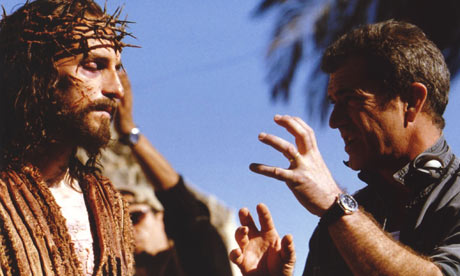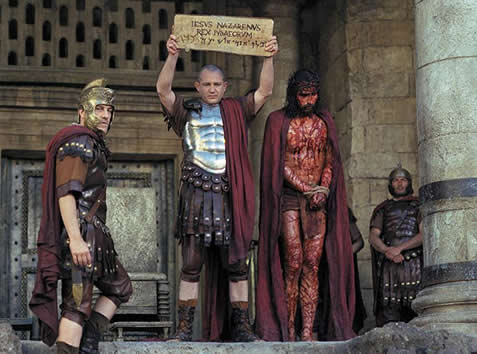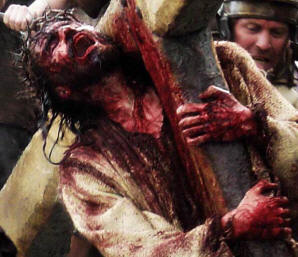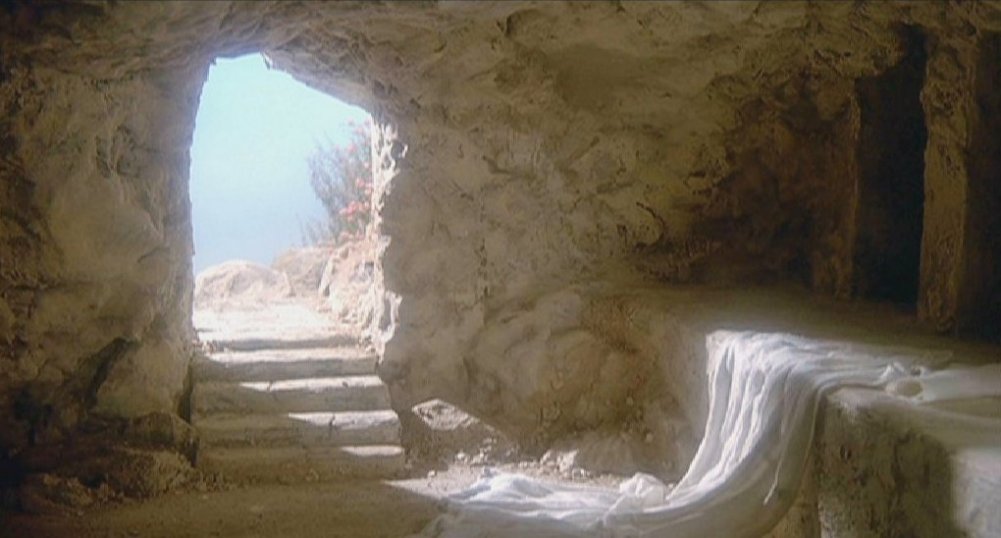Gibson gambled in both The Passion and Apocalypto, presenting historical drama in contemporary languages to subtitle-illiterate Americans, counting on raw violence and a fast pace to retain their attention. The Passion of the Christ is almost docudrama, following Jesus on his Via Dolorosa ("way of sorrow") in the last hours before his crucifixion. Apocalypto takes place in the doomed Mayan civilization literally moments before the arrival of the Spanish conquistadors.
 The Passion of the Christ isn't officially censored in Israel, but in tacit consent between the local distributors and the Israeli audience it isn't marketed here. (I was only able to see it on Utube.) It's just a modern version of Medieval passion plays once produced by the catholic church, more often than not the spark igniting drunken riffraff only too willing to exact revenge on the local Jewish community. At least that is how it's seen here. And besides, a crucifixion isn't going to move an Israeli crowd – in Second Temple Judea it was almost death by natural causes.
The Passion of the Christ isn't officially censored in Israel, but in tacit consent between the local distributors and the Israeli audience it isn't marketed here. (I was only able to see it on Utube.) It's just a modern version of Medieval passion plays once produced by the catholic church, more often than not the spark igniting drunken riffraff only too willing to exact revenge on the local Jewish community. At least that is how it's seen here. And besides, a crucifixion isn't going to move an Israeli crowd – in Second Temple Judea it was almost death by natural causes.Objectively speaking, the telling of Jesus' crucifixion is certainly legitimate, even essential for Christians. Gibson's version isn't blatantly anti-Semitic, but he slips a latent bias in between the lines. He washes Roman hands of guilt; a reluctant Pilate who issues the death warrant, and the ignorant bullies who drive in the nails – Gibson forgives them for they know not what they do. He places the Christ's murder squarely on the Jews; if it's sanctimonious priests scheming and manipulating others to do their dirty work, or a lynch mob screaming for blood. But to be honest, Gibson's portrayal of Jews is accurate. The first century Jewish leadership was never accused of being 'nice' by their contemporaries, and Judeans weren't a gentle bunch, as Roman legions would discover time and again. Saying that, let me remind any Christians latching on to the above "admission of guilt" in order to browbeat present day Jews 2000 years removed from the crime, according the gospels it was first and foremost Jesus orchestrating the events that lead to his crucifixion – otherwise he isn't who he says he is and he was simply the sad victim of a case of mistaken identity. And as for Jewish kneejerk defensiveness at any mention of Jesus, we won't erase anti-Semitism by repainting the past.
 In Apocalypto, an idyllic indigenous village in the jungle is raided and its inhabitants force-marched to a city belonging to a more advanced Mayan civilization. The story focuses on the captive Jaguar Paw, following him from his abduction on through the frenzied Mayan crowd. After the women are auctioned off, the men are painted blue and led up to a temple where one by one their beating hearts are to be cut out to ensure the pleasure of the gods and a good harvest. Jaguar Paw's life is spared by a total eclipse of the sun (a sign of the god's favor) and he exploits the opportunity to make a break for the jungle. He is doubly fortunate, for just as his pursuers catch up with him on the beach, they meet a landing party of armored Spaniards and priests who appear to them as gods, to Jaguar Paw (and Mel Gibson) as saviors.
In Apocalypto, an idyllic indigenous village in the jungle is raided and its inhabitants force-marched to a city belonging to a more advanced Mayan civilization. The story focuses on the captive Jaguar Paw, following him from his abduction on through the frenzied Mayan crowd. After the women are auctioned off, the men are painted blue and led up to a temple where one by one their beating hearts are to be cut out to ensure the pleasure of the gods and a good harvest. Jaguar Paw's life is spared by a total eclipse of the sun (a sign of the god's favor) and he exploits the opportunity to make a break for the jungle. He is doubly fortunate, for just as his pursuers catch up with him on the beach, they meet a landing party of armored Spaniards and priests who appear to them as gods, to Jaguar Paw (and Mel Gibson) as saviors.It's not hard to decipher Gibson's agenda from his work; it's apologetics for the traditional catholic church, with one hand pointed at Christ killers, and the other twisting a positive spin on the Spanish crimes of conquest (and subsequent forced catholic conversion) of the native population of Central America. But it is in the parallels and contrasts between the two films one can find the fallacy in Gibson's portrayal of Jesus' crucifixion.
Human sacrifice plays on passion. By our very nature, we can't help but be moved when observing the ritual murder of another person. So I have to agree with the verdict of the Jewish audience on this one, even if not with their polemics. Gibson's Passion is fueled by the same raw emotion that turned the wheels of idolatry and Papal violence, reducing Jesus' crucifixion to no more than another version of paganism. The Passion of the Christ is only a modern rendition of an ancient universal genre, one that has tugged at human hearts, sometimes literally, since the dawn of time.
Gibson could have featured the gory crucifixion of any one of thousands of Jews 2000 years ago and would have generated the same emotion. The cross doesn't make Jesus the Messiah.
In the last 60 seconds of the Passion, Gibson takes us to a tomb. The stone rolls away and the camera pans over to an empty shroud. Jesus comes into focus, stands and the last we see of him is a nail-pierced hand. An empty grave doesn't play on emotion and it won't generate box office hits, but it makes all the difference between victim and Messiah.
In Apocalypto, men are made gods to be sacrificed to save the Mayans from famine; in The Passion it is God made flesh to save men. Both films pivot on celestial signs, the solar eclipse vis-à-vis God darkening midday to night. In both the spectators - the Mayan crowd or modern theater audiences - are riveted to the drama of human sacrifice. And there's the rub.
Human sacrifice plays on passion. By our very nature, we can't help but be moved when observing the ritual murder of another person. So I have to agree with the verdict of the Jewish audience on this one, even if not with their polemics. Gibson's Passion is fueled by the same raw emotion that turned the wheels of idolatry and Papal violence, reducing Jesus' crucifixion to no more than another version of paganism. The Passion of the Christ is only a modern rendition of an ancient universal genre, one that has tugged at human hearts, sometimes literally, since the dawn of time.
Gibson could have featured the gory crucifixion of any one of thousands of Jews 2000 years ago and would have generated the same emotion. The cross doesn't make Jesus the Messiah.
In the last 60 seconds of the Passion, Gibson takes us to a tomb. The stone rolls away and the camera pans over to an empty shroud. Jesus comes into focus, stands and the last we see of him is a nail-pierced hand. An empty grave doesn't play on emotion and it won't generate box office hits, but it makes all the difference between victim and Messiah.






2 comments:
I didn't know too much about Apocalypto. It seems like an interesting mix of views. Do you recommend it? And if so what are the positive points that do appropriately offer a good point?
Apocalypto is very violent, some nudity (indiginous people portrayed accurately), but a good story line and a very high quality film. It shows idolatry for what it was (is), and that is important, as modern westerners think tend tend to rationalize and accept evil nowdays.
As for the Passion, I think the emphasis on the cross makes for a very gripping movie, but without the empty grave it is just another tragedy. Gibson should have given the grave more than a minute at the end.
Post a Comment